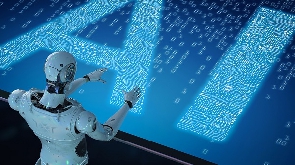Opinions of Friday, 7 July 2023
Columnist: Evans Mawunyo Tsikata
A required good, always in change
As the world grows more digitized, artificial intelligence (AI) is becoming more and more important. Artificial intelligence (AI) is the creation of computer systems that are capable of doing tasks that traditionally require human intelligence, such as learning, problem-solving, and decision-making.
Its promise to deal with difficult challenges and give illuminating data, as well as its potential to automate tiresome operations, make it beneficial. We'll examine the significance of AI and how it has impacted a range of fields, including business, education, and society at large in this essay.
African economies, healthcare systems, and agriculture might all gain from advances in AI. AI can provide telemedicine, diagnosis assistance systems, and remote monitoring to close healthcare gaps, increase productivity, and enhance food security. AI can assist with conservation, education, and infrastructure development in Africa. By enabling online platforms, individualized learning, and easier resource access, AI can raise the level and breadth of education. It can also protect wildlife, monitor deforestation, and promote sustainable development. AI makes it possible to analyze data and make thoughtful decisions in order to address societal issues like poverty, disease outbreaks, and climate change.
The overwhelming majority of people are terrified and feel threatened by the development of AI. Some even believe that the development of AI will render human reasoning obsolete. There is no way that could ever happen.
The impact of AI on the workforce is a challenging and divisive topic. While AI-based technologies have the potential to automate some tasks that were previously performed by humans, they also have the capacity to create new jobs and enhance those that already exist. The likelihood of artificial intelligence totally replacing human labor is lower than the likelihood that it will improve human capabilities and productivity.
AI can automate tedious, mundane tasks, freeing humans to focus on complex, creative ideas. It can perform data analysis, spot trends, and complete routine jobs more quickly and accurately, freeing up human workers to exercise critical thought, work through issues, and generate fresh ideas.
In some industries, AI may lead to job losses, but it can also create new career opportunities, particularly in the areas of AI development, data analysis, algorithm design, and AI system maintenance. Additionally, AI can help brand-new markets and business models emerge. Regarding the concern that AI would reduce human intelligence, it's important to keep in mind that AI supports and enhances human intelligence, not replaces it. Individuals and organizations must use AI ethically and ensure that it promotes rather than inhibits human cognition.
Additionally, human interaction is necessary for the continuing training, monitoring, and refinement of algorithms in AI technology. Human oversight is necessary to ensure ethical considerations, prevent prejudices, and make major decisions based on contextual understanding.
AI has the potential to alter the nature of work and create new opportunities. While technology might have an effect on some job activities, productivity and human skills are also positively impacted. It is essential to adapt and reskill the workforce in order to make the most of AI's potential and guarantee that the rewards are shared fairly.
To keep up with the current trend and prevent falling behind, we must act promptly. Africa is falling behind, so if a chance like this presents itself, we must seize it.
You can take the following steps to keep up with AI advancements in Africa: Education and Learning Do your best to get knowledgeable with AI theories, advancements, and applications. Look for online workshops, webinars, courses, and tutorials on artificial intelligence.
Relevant AI and machine learning courses can be found on websites like Coursera, edX, and Udemy. Networking and Communities: Connect with professionals and enthusiasts by joining AI-focused groups, forums, and communities online and off. Attend conferences, meetings, and events in your country or region that are linked to AI. Participate in discussions, share your knowledge, and get perspective from others.
Follow the newest publications and studies on artificial intelligence that concern Africa. Find research papers, articles, and studies from academic institutions and think tanks. Organizations like AI for Development (AI4D) issue reports on AI in Africa that provide information on the opportunities and challenges the technology provides on the continent. Follow publications, tech blogs, and media outlets that focus on AI that cover AI developments in Africa. Keep up with the most recent initiatives, projects, discoveries, and success tales concerning the application of AI to sectors like healthcare, agriculture, finance, and education.
Look for opportunities to interact with African-based businesses, research centers, or organizations that have an AI focus. Look into partnering with groups, companies, and governments engaged in AI projects. By collaborating and networking, you may contribute to AI initiatives in Africa and stay up to date on AI developments. Take part in AI challenges and competitions: Participate in competitions, hackathons, or challenges using AI to address problems specific to Africa. These competitions provide opportunities for practical training, exposure, and collaboration with AI experts, mentors, and potential employers.
Keep up with regional or governmental initiatives to put AI-related policies and programs into effect. Governments may fund AI research, establish centers or institutes, and create moral guidelines. You will have a better understanding of the local AI scene if you are aware of these programs. Keep in mind that since artificial intelligence is a field that is constantly changing, ongoing learning and adaptability are necessary.
Consider how artificial intelligence connects to topics like morality, the rule of law, public policy, and societal influence while taking into account the fact that it is interdisciplinary in nature. You can keep up with AI advancements in Africa and make a major contribution to the ecosystem by remaining curious, becoming involved, and learning from a variety of sites.
In conclusion, it is impossible to overestimate the significance of artificial intelligence (AI) in Africa. It has the potential to alter a variety of industries, including healthcare, agriculture, and education, by improving the accuracy, efficiency, and efficacy of decision-making systems. Crop productivity can be increased, diagnostic abilities can be improved, and kids can have individualized learning opportunities thanks to AI.
However, Africa must make the necessary infrastructural investments, promote a creative culture, and offer sufficient training to ensure that AI is applied sensibly and morally. Africa may realize its full potential and open the door to a rich and technologically advanced future by adopting AI.













